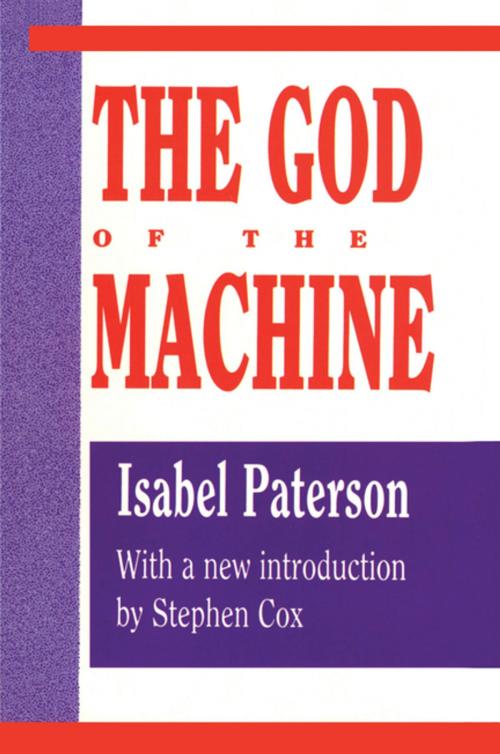| Author: | Isabel Paterson | ISBN: | 9781351517140 |
| Publisher: | Taylor and Francis | Publication: | July 5, 2017 |
| Imprint: | Routledge | Language: | English |
| Author: | Isabel Paterson |
| ISBN: | 9781351517140 |
| Publisher: | Taylor and Francis |
| Publication: | July 5, 2017 |
| Imprint: | Routledge |
| Language: | English |
The God of the Machine presents an original theory of history and a bold defense of individualism as the source of moral and political progress. When it was published in 1943, Isabel Paterson's work provided fresh intellectual support for the endangered American belief in individual rights, limited government, and economic freedom. The crisis of today's collectivized nations would not have surprised Paterson; in The God of the Machine, she had explored the reasons for collectivism's failure. Her book placed her in the vanguard of the free-enterprise movement now sweeping the world.Paterson sees the individual creative mind as the dynamo of history, and respect for the individual's God-given rights as the precondition for the enormous release of energy that produced the modern world. She sees capitalist institutions as the machinery through which human energy works, and government as a device properly used merely to cut off power to activities that threaten personal liberty.Paterson applies her general theory to particular issues in contemporary life, such as education, .social welfare, and the causes of economic distress. She severely criticizes all but minimal application of government, including governmental interventions that most people have long taken for granted. The God of the Machine offers a challenging perspective on the continuing, worldwide debate about the nature of freedom, the uses of power, and the prospects of human betterment.Stephen Cox's substantial introduction to The God of the Machine is a comprehensive and enlightening account of Paterson's colorful life and work. He describes The God of the Machine as "not just theory, but rhapsody, satire, diatribe, poetic narrative." Paterson's work continues to be relevant because "it exposes the moral and practical failures of collectivism, failures that are now almost universally acknowledged but are still far from universally understo
The God of the Machine presents an original theory of history and a bold defense of individualism as the source of moral and political progress. When it was published in 1943, Isabel Paterson's work provided fresh intellectual support for the endangered American belief in individual rights, limited government, and economic freedom. The crisis of today's collectivized nations would not have surprised Paterson; in The God of the Machine, she had explored the reasons for collectivism's failure. Her book placed her in the vanguard of the free-enterprise movement now sweeping the world.Paterson sees the individual creative mind as the dynamo of history, and respect for the individual's God-given rights as the precondition for the enormous release of energy that produced the modern world. She sees capitalist institutions as the machinery through which human energy works, and government as a device properly used merely to cut off power to activities that threaten personal liberty.Paterson applies her general theory to particular issues in contemporary life, such as education, .social welfare, and the causes of economic distress. She severely criticizes all but minimal application of government, including governmental interventions that most people have long taken for granted. The God of the Machine offers a challenging perspective on the continuing, worldwide debate about the nature of freedom, the uses of power, and the prospects of human betterment.Stephen Cox's substantial introduction to The God of the Machine is a comprehensive and enlightening account of Paterson's colorful life and work. He describes The God of the Machine as "not just theory, but rhapsody, satire, diatribe, poetic narrative." Paterson's work continues to be relevant because "it exposes the moral and practical failures of collectivism, failures that are now almost universally acknowledged but are still far from universally understo















